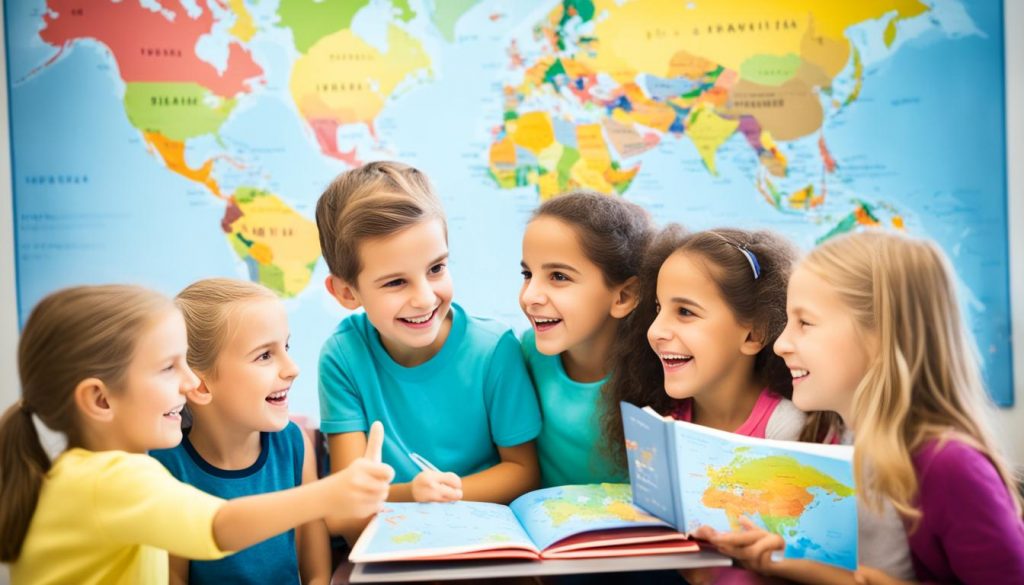At a time when the world is becoming increasingly globalized, there is a growing recognition of the importance of raising multilingual children. The ability to speak multiple languages is not only a valuable skill but also provides a host of benefits for individuals, their families, and the broader society. In this article, we will explore the numerous advantages of multilingualism and why it is worth investing in the linguistic development of our children.
When we talk about raising multilingual kids, we are referring to children who have the opportunity to learn and use more than one language fluently. Whether it is speaking the native language at home and learning a second language at school or growing up in a bilingual household, the benefits of multilingualism are undeniable.
So, what are the benefits of multilingualism? First and foremost, being bilingual or multilingual enhances cognitive development. Research has shown that bilingual children have an easier time understanding math concepts, developing strong thinking skills, using logic, focusing, remembering, making decisions, thinking about language, and even learning other languages. Their brains are highly active and flexible, leading to improved cognitive abilities.
In addition to cognitive development, multilingualism also promotes social-emotional development. Bilingual children have the advantage of maintaining strong ties with their family, culture, and community. They can communicate with extended family members and engage confidently with people who speak their heritage language. This not only fosters a sense of belonging and cultural identity but also equips them with valuable social skills needed in our diverse society, such as making new friends and creating strong relationships using their second language.
Furthermore, language development is a significant benefit of being multilingual. Learning to read and think in two or more different languages promotes higher levels of abstract thought and contributes to academic success. Mastery of the home language provides a strong foundation for learning a second language, as children can easily apply their knowledge about reading to their second language.
Looking ahead, raising multilingual children sets them up for long-term success. Bilingual and biliterate adults have more job opportunities in today’s globalized world. They can participate in the global community in more meaningful ways, gaining cultural understanding and accessing diverse resources.
The benefits of multilingualism are undeniable, and it is crucial to support the linguistic development of our children. In the following sections, we will delve deeper into the specific advantages of multilingualism, discuss strategies for supporting bilingualism, and explore how language and cultural identity are interlinked.
Key Takeaways:
- Raising multilingual children offers numerous benefits for individuals, families, and society as a whole.
- Being bilingual or multilingual enhances cognitive development, social-emotional development, and long-term success.
- Multilingual children have an easier time understanding math concepts, developing strong thinking skills, and learning other languages.
- Bilingualism promotes strong family ties, cultural identity, and increased social skills.
- Language development is enhanced through multilingualism, leading to better academic success and higher levels of abstract thought.
Cognitive Development
Bilingual and biliterate individuals experience enhanced cognitive development compared to their monolingual counterparts. Their ability to understand math concepts, develop strong thinking skills, utilize logic, focus, remember, make decisions, think about language, and learn other languages is significantly improved.
The active and flexible nature of their brains contributes to their cognitive abilities. Bilingualism also promotes higher levels of abstract thought, which is crucial for effective learning and problem-solving.
Here is a table summarizing the cognitive benefits of bilingualism:
| Benefit | Description |
|---|---|
| Enhanced understanding of math concepts | Bilingual individuals have an easier time comprehending mathematical principles and applying them. |
| Development of strong thinking skills | Bilingualism sharpens cognitive abilities, allowing for improved critical thinking and problem-solving. |
| Improved logic and decision-making | Bilingual individuals are skilled at using logical reasoning and making informed choices. |
| Enhanced language understanding | Bilingualism facilitates a deeper understanding of language structures, grammar rules, and vocabulary. |
Language Understanding and Cognitive Abilities
The ability to think about language and switch between different languages helps bilingual individuals develop metalinguistic awareness and boosts their overall cognitive capabilities. They possess a heightened awareness of language structure, enabling them to comprehend complex linguistic concepts more effectively.
Bilingualism fosters cognitive flexibility, enabling individuals to adapt to different cognitive tasks and switch between various mental processes. This cognitive flexibility allows for efficient information processing and facilitates improved executive functions.
Social-Emotional Development
Being bilingual has a significant impact on social-emotional development, as it supports children in maintaining strong connections with their family, culture, and community. These ties are crucial for their developing identity, providing a sense of belonging and cultural identity. Bilingual children have the advantage of being able to make new friends and form strong relationships using their second language, which is a valuable skill in our diverse society.
Research has shown that babies raised in bilingual households display better self-control, which is considered a key indicator of school success. The ability to control impulses and regulate emotions has a direct influence on a child’s academic performance and overall well-being. Bilingualism fosters self-control, enabling children to thrive in a school environment and excel academically.
Moreover, bilingualism contributes to the development of a rich cultural identity. By being exposed to multiple languages and cultures, children gain a deeper appreciation for their heritage and develop a strong sense of cultural pride. They can confidently connect with extended family members and others who speak their heritage language, maintaining their cultural traditions and customs.
Language Development
Mastery of the home language plays a crucial role in the school readiness and overall success of dual or multi-language learners. Bilingual and multilingual children have a distinct advantage as they develop flexible approaches to problem-solving, allowing them to navigate various challenges through different linguistic lenses. Additionally, their ability to read and think in two or more languages promotes higher levels of abstract thought, which is essential for effective learning.
Learning to read in their home language provides a strong foundation for grasping a second language. Children can effortlessly apply their existing knowledge of reading to their second language, bolstering their comprehension and literacy skills. This interplay between languages enhances their overall language proficiency and fosters a holistic approach to language development.
Moreover, bilingual and multilingual children develop a unique ability to effortlessly switch between languages, allowing them to adapt to diverse linguistic environments with ease. This language switching not only supports their cognitive flexibility but also expands their vocabulary and language repertoire.
Long-Term Success
Being bilingual and biliterate opens up a world of opportunities for long-term success. In today’s global society, fluency in multiple languages is highly valued and sought after by employers worldwide. Bilingual and biliterate adults have a competitive edge in the job market, with access to a broader range of job opportunities and career paths.
By speaking more than one language, individuals can effectively communicate with a diverse range of people from different cultures and backgrounds, fostering cultural understanding and promoting global collaboration. This ability to bridge language barriers and connect with others on a deeper level enhances professional relationships and promotes teamwork in multicultural work environments.
Moreover, being bilingual and biliterate enables individuals to participate actively in the global community. They can access information from a variety of sources, engage in international networks, and stay informed about global trends and developments. This global perspective offers a broader understanding of different cultures and allows for more meaningful interactions with people from all over the world.
Ultimately, the long-term success of bilingual and biliterate individuals is not solely limited to career opportunities. The ability to navigate different cultures and languages fosters cultural understanding and empathy, promoting a more inclusive and interconnected world.
Benefits of Bilingualism in Achieving Long-Term Success:
- Increased job opportunities and career flexibility
- Enhanced communication skills in diverse settings
- Improved cultural understanding and global awareness
- Access to a wider range of information and resources
- Opportunities for personal and professional growth
With the undeniable advantages and long-term benefits of bilingualism, investing in language learning and promoting cultural understanding not only enriches individuals but also contributes to a more interconnected and harmonious global community.
| Benefits | Explanation |
|---|---|
| Increased job opportunities | Bilingual and biliterate individuals have access to a wider range of job opportunities globally. |
| Enhanced communication skills | Bilingual individuals can effectively communicate and connect with people from different cultures, promoting cultural understanding in professional settings. |
| Improved global awareness | Bilingualism fosters a broader understanding of different cultures and perspectives, enabling individuals to participate actively in the global community. |
| Access to diverse information | Bilingual individuals can access information from various sources and stay informed about global trends and developments. |
| Personal and professional growth | Bilingualism provides opportunities for personal and professional growth, fostering an inclusive and interconnected world. |
Embracing bilingualism not only provides a path for personal and professional growth but also contributes to the development of a global society rooted in cultural understanding and collaboration.
Language and Cultural Identity
Raising multilingual children is not only about language acquisition, but it also plays a crucial role in language preservation and cultural pride. When children grow up speaking more than one language, they develop a strong connection with their heritage and can confidently engage with their extended family members and others who speak their heritage language.
Speaking multiple languages allows children to feel a sense of belonging and pride in their cultural identity. They can comfortably navigate different cultural contexts, appreciate diverse perspectives, and embrace their cultural heritage. This multilingual upbringing provides them with a unique advantage in understanding and appreciating various cultures.
Moreover, being multilingual allows children to directly learn and hear stories from their family members, preserving the cultural traditions and oral histories that are passed down through generations. They can engage with cultural resources, such as music, movies, and literature, in more than one language, deepening their connection to their cultural heritage.
Language and cultural identity are intertwined, and multilingualism serves as a powerful tool for preserving and passing on cultural heritage to future generations. It ensures that languages, traditions, and values are not lost but celebrated and cherished.
Supporting Multilingualism
Supporting multilingualism is essential for raising bilingual children. It requires dedication and active involvement from parents and caregivers. By prioritizing language exposure, bilingual education, and community resources, we can create an enriching language learning environment for our children.
Sticking with the Heritage Language
It’s important for parents to stay committed to their heritage language, even when there may be external pressures to choose English as the dominant language. Consistency is key in language development, so providing plenty of opportunities for children to hear and use their heritage language is crucial. By maintaining the use of the heritage language at home and in everyday interactions, we can reinforce its importance and value.
Communicating the Benefits of Multilingualism
Reminding ourselves and our children about the many advantages of multilingualism and bilingualism is essential. By highlighting the cognitive, social, and cultural benefits, we can foster a positive attitude towards language learning. Helping children understand how being bilingual opens doors to a wider range of opportunities can further motivate them to embrace their languages.
Collaborating with Teachers
Teachers play a vital role in supporting multilingualism. Collaborating with educators to create a language-rich classroom environment can greatly enhance language exposure. By working together, we can ensure that our children have access to appropriate bilingual education programs and resources that promote language development and academic success.
Accessing Community Resources
Utilizing community resources can greatly support multilingualism. Bilingual playgroups, language immersion programs, and cultural events allow children to interact with peers who share their heritage language and culture. These resources provide opportunities for language practice, cultural exchange, and the development of a strong bilingual community.
By supporting multilingualism through language exposure, bilingual education, and community resources, we can create a nurturing environment that encourages language development and cultural preservation. Together, let’s empower our children to embrace their multilingual abilities and celebrate the richness of language diversity.
Conclusion
Raising multilingual children has numerous benefits for individuals, families, and communities. It enhances cognitive development, social-emotional development, and long-term success. Bilingual individuals have better math understanding, thinking skills, logic, decision-making abilities, and language skills.
Multilingualism strengthens family bonds, cultural identity, and sense of self-worth. It also opens up diverse opportunities for work, travel, and cultural engagement.
Supporting multilingualism requires consistent language use, positive language exposure, and community support. By investing in the development of multilingual children, we are providing them with valuable tools for their future.
FAQ
What are the benefits of raising multilingual children?
Raising multilingual children has numerous benefits, including enhanced cognitive development, social-emotional development, and long-term success. Bilingual children have better math understanding, thinking skills, logic, decision-making abilities, and language skills.
How does bilingualism contribute to cognitive development?
Bilingualism fosters cognitive development by aiding in understanding math concepts, developing strong thinking skills, using logic, focusing, remembering, making decisions, thinking about language, and learning other languages. Bilingual individuals have active and flexible brains, which contributes to their cognitive abilities.
Does being bilingual support social-emotional development?
Yes, being bilingual supports social-emotional development. It helps children maintain strong ties with their family, culture, and community, contributing to their developing identity. Research shows that babies raised in bilingual households exhibit better self-control, which is a key indicator of school success. Bilingualism also enhances a sense of belonging and cultural identity.
How does language development differ for bilingual children?
Bilingual children benefit academically by developing flexible approaches to problem-solving. They also have higher levels of abstract thought, which is important for learning. Learning to read in the home language provides a strong foundation for learning a second language, as children can easily apply their knowledge about reading to their second language.
Can being bilingual lead to long-term success?
Yes, being bilingual opens up more job opportunities globally compared to being monolingual. Bilingual individuals can participate in the global community in various ways, access information from different sources, and gain insights into other cultures. Being bilingual and biliterate provides advantages and opportunities in today’s global society.
How does multilingualism contribute to language and cultural identity?
Raising multilingual children helps preserve language and cultural pride. It allows children to feel good about their heritage and confidently connect with extended family members. Multilingualism enables direct engagement with cultural resources and the ability to learn and hear stories in more than one language, leading to a stronger sense of cultural identity.
How can I support multilingualism in my child?
Supporting multilingualism requires commitment and effort. Stick with the heritage language, even when there is pressure to choose English. Provide plenty of opportunities for the child to hear and use their heritage language. Remind yourself and communicate the benefits of multilingualism. Collaborate with teachers and access community resources, such as bilingual playgroups, to enhance language exposure.
What are the overall benefits of raising multilingual children?
Raising multilingual children is a valuable investment for their future. It enhances cognitive development, social-emotional development, and long-term success. It strengthens family bonds, cultural identity, and sense of self-worth. It also opens up diverse opportunities for work, travel, and cultural engagement.



